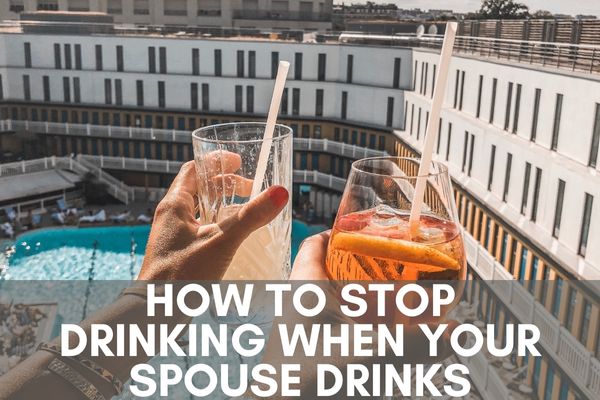“How to stop drinking when your spouse drinks” In a perfect world, once you realize you have a problem with drugs and alcohol and decide to quit, your friends, your family, and especially your significant other would all respect your struggle and quit drinking, too, at least around you.
However, the reality is seldom so obliging. We live in a drinking culture where the majority of Americans and Europeans drink at least occasionally and often regularly.
How To Stop Drinking When Your Spouse Drinks
For people who are capable of drinking moderately, that’s not a big deal, but for you, it can be frustrating trying to stay sober when the people around you are drinking.
It can be incredibly challenging if your spouse continues drinking in your presence, especially early on.
However, you will often find that in recovery, you have to make the best of a bad situation, which is no different.
If you are trying to stay sober and your partner still drinks, here are some tips for making the best of it.

-
Communicate
Communication is crucial, and not every couple is excellent or competent. There are several reasons for this.
First, you can hardly expect your partner to help you if they don’t know what you need.
Maybe you’ve said, “Hey, would you mind not drinking around me for the next six months while I’m just starting?” And they said, “Sorry, no,” and that was the end.
Maybe you just assumed they would quit drinking, too, but the thought never crossed their mind.
Even if you did raise the issue and they said they wouldn’t quit drinking, there may be other ways they are willing to accommodate you, but you have to learn to communicate to work these things out.
You may even need couples therapy to work on communication in general. The second reason communication is important is that poor communication leads to more conflicts, and frequently arguing with your spouse is one of the most significant ways to ratchet up your stress–one of the most potent triggers of cravings.
Learning to communicate better reduces stress and reduces cravings.
-
Know Your Triggers
It’s always important to know your triggers–the people, places, and things that cause drug and alcohol cravings.
While some general things tend to trigger cravings for most people–stress, for example–other desires can be particular, such as a friend you always used to drink with, a favorite bar, or even a specific holiday or anniversary.
The good news is that the more aware you are of your specific cravings, the more information you can give your partner, and the better you can work out practical compromises.
Maybe one particular restaurant triggers cravings, but another similar restaurant doesn’t.
Maybe the smell of tequila triggers cravings, but the scent of gin puts you off entirely. The more you know about these things, the more you can work around them.

-
Maintain Healthy Boundaries
As with communication, maintaining healthy boundaries is essential in a relationship and especially important when recovering from addiction.
Simply put, healthy boundaries are when you respect your partner’s values and autonomy, and they respect yours.
So while it’s important to express your needs and ask them to help, you must realize that you ultimately can’t control what they do.
It’s also important to assert your values and independence. It’s relatively common for people with substance use issues to get involved in codependent relationships, in which one person forsakes their own needs and desire to care for the other, which is bad for both partners.
If boundaries are a problem for you, you may need couples therapy, or you may even need to consider separating.
-
Involve Them in Recovery
As noted above, it’s often a good idea to participate in couples therapy when communication or boundaries become a problem.
Often, family therapy is even an integral part of addiction treatment programs. However, involving your significant other in recovery goes far beyond that.
Many programs offer education sessions to help family members better assist their loved one’s recovery.
Having a better understanding of how addiction works and the roles family play can make them feel more engaged in the process and better able to help.
They may also benefit from participating in a group like Al-Anon or Nar-Anon, which can help them better understand what you’re going through while offering them some emotional support.

-
Move Things Around
One major challenge in having a partner who still drinks is if they want to keep alcohol in the house.
While it’s better to keep alcohol and drugs out of the house entirely, you may be able to reach an acceptable compromise.
For example, maybe they can keep their beer in a different fridge, perhaps in a room you don’t go into very often, so you aren’t confronted with a case of beer every time you want to make a sandwich.
Maybe they can drink something you’re not especially fond of rather than your go-to drink.
Perhaps there are other triggering items in the house that you could get rid of, put in storage, or put somewhere you’re less likely to see them. As discussed above, it all comes down to knowing your triggers and being able to communicate.
-
Make a Plan for Socializing
Home arrangements aren’t the only challenge. If you’re going out, especially with friends, you may have to strategize how best to avoid triggers and temptations.
For example, you might take separate cars if you want to leave early. You may prefer certain friends to others.
You may decide that, for some occasions, it would be better if you stayed home or did something else while your partner went out.
When you go out together, it may be a good idea to remind your partner that they shouldn’t let you drink. Get them to promise, if necessary.
-
Remember That You’re Ultimately Responsible
It would be great if your partner were wholly committed to helping you stay sober and willing to do whatever it takes.
Unfortunately, that’s not always the case; even supportive partners don’t always know the right thing to do in every situation.
The critical thing to remember is that although support is excellent, you are ultimately responsible for your recovery. Life is often messy, and sometimes you must weigh all your competing motivations and make the best choice possible.
It’s possible that your partner won’t stop drinking but is still, on balance, good for you and good for your recovery.
Communicate your needs as well as you can, maintain healthy boundaries, and make strategic compromises, and most of the time, you should be able to stay sober, even if your partner drinks.
-
Consider Inpatient Treatment
Sobriety can be a complicated process even when you’re surrounded by support and utterly detached from alcohol – it’s even more so when alcohol is still part of your family.
If you feel overwhelmed and unsure how to proceed with your recovery, consider seeking inpatient treatment.
Inpatient or residential treatment provides a safe and supportive healing environment where you can focus entirely on your recovery.
Inpatient therapy can strengthen your balance and stability and provide the tools you need to manage your recovery in the home where alcohol is present.
Other Helpful Strategies
On top of the above strategies, there are several things you can do to take care of yourself in recovery—which makes staying sober when your spouse is drinking that much easier. These include:
- Replacing unhealthy habits with healthy alternatives (such as journaling, swimming, cycling, and drawing)
- Spending time with supportive friend members and support groups
- Exercising and eating nutritious meals
- Get enough rest
In social situations involving alcohol, you may also try this:
- Carry a glass of water, soda, or a mocktail to limit drink offerings and occupy your hands
- Prepare to respond when people offer you a drink
- Bring along an ally to help you stay on the right track, or have a friend you can call on if things go wrong
- Maintaining physical and mental health makes it much easier to make healthy choices and live positive lives.
And if you know, you’re close to people who drink, having a plan and support system in place can make things less stressful.

Moderation As An Option
Another thing to consider if you have a partner or loved ones who still drink is whether you prefer abstinence or moderation.
For a long time, the only option available to alcoholics was to quit smoking altogether.
However, the past few decades have brought about changes in the treatment of alcohol. It is now possible for some people to learn to drink in moderation.
One advantage is that it allows you to avoid the stress of maintaining such rigid boundaries — with such stark definitions of success and failure on both sides.
Anti-craving medications can help you gradually limit or cut back on your consumption. You may be able to down that “one beer” without causing a full relapse.
This can relieve stress and allow you to maintain sobriety around people still drinking. There are people for whom it is necessary to quit smoking altogether or they feel the best.
But for others, complete abstinence can feel impossible, leading to hopelessness, frustration, and inadequacy.
This can be especially true if you are surrounded by people who drink. If moderation is possible for you and allows you to live a healthier life with the people you love, then it is worth considering this option.
Conclusion
Take a moment to think about how you are already different from your partner. There will be many areas in which their behavior does not influence your beliefs, choices, or habits.
Letting go of alcohol can be just another one of those things where they make one choice, and you make another.
Your relationship is about so much more than the liquid you pour into your glass.








